Although there is no single most important trait, learning to find motivated seller leads can be one of the most critical skills in real estate investing. Finding motivated seller leads all comes down to having the right process for continuous lead generation.
Key Takeaways
- There are five signs that a seller is motivated:
- They’re in a life-changing situation (divorce, bankruptcy, job transfer, etc.)
- They want to downsize
- The property has been sitting on the MLS for a while
- The owner is straightforward about the condition of the property
- The owner is absente and/or the property is sitting vacant
- Cold calling and direct mail generate motivated seller leads, but a good website can be a consistent source of leads without the manual outreach effort.
- Once you determine your maximum offer, it’s often wise to start negotiations with a lower figure. This leaves room for compromise and creates the potential for additional profit if the seller accepts your initial offer. A common approach is to subtract $20,000 from your pre-determined maximum cash offer.
Read on to understand what a motivated seller lead is, how to find motivated sellers (we share 11 different tactics), and learn how to negotiate these deals!
Table of Contents
- What Separates Struggling Real Estate Investors from Successful Ones?
- What Are Motivated Sellers?
- 5 Signs That a Seller is Motivated
- Top 11 Ways to Find Motivated Seller Leads
- Online Strategies: Casting Your Net in the Digital World
- Traditional Strategies: Building Relationships and Hitting the Pavement
- Creative Strategies: Thinking Outside the Box
- The Difference Between Inbound & Outbound Lead Generation
- The Simple Motivated Seller Lead Generation Formula
- How to Negotiate with Motivated Sellers
- A Multi-Faceted Approach to Finding Motivated Sellers
What Separates Struggling Real Estate Investors from Successful Ones?
If there’s one thing that separates a struggling investor from most successful real estate investors, it’s their systems for generating leads. They have processes that work like clockwork day in and day out.

Demo Carrot: How many deals are you losing to your competitor’s website?
Take a Free DemoTop investors generate 20 or more high-quality, motivated seller leads per month.
Does that sound too good to be true? It’s not.
In 2003, we built our first website to generate motivated seller leads for wholesalers. Since then, we’ve refined our marketing systems, website platforms, and overall strategy for driving leads online.
We’ve generated over 1,253,267 real estate-related leads in the past 5 years alone.
The lead generation strategies and options we will teach you in this article have been proven. Although they can take some upfront work, once the ball is rolling, you can generate monthly leads.
Ready to learn how to find motivated sellers?
Let’s do this.
What Are Motivated Sellers?
A motivated seller is an owner who needs to get rid of their property quickly and meets at least one of the following conditions:
- They are willing to sell below market value at a 10-30% price.
- They are ready to sell under specific terms. Including no money down and no interest.
In an ideal situation, you’d want both conditions, but one advantage of working with them is that they have reasons to sell fast. You’re there to help them solve the problem.
Some common types of motivated sellers include:
- Distressed sellers
- Landlords
- Facing foreclosure
- Relocating
- Bank in possession of REOs
- Divorce
- Inherited houses
- Recent job loss
5 Signs That a Seller is Motivated
You know what a motivated seller lead is.
But how can you spot them?
Here are five signs that a seller is motivated — you can gather this information through public records, online research, and, most importantly, talking directly to the seller.
- Life-Changing Situation: If the owner is going through a life-changing situation like divorce, probate, bankruptcy, or moving across the country, they are far more likely to be in a hurry to sell… and to care less about how much they get.
- Wants to Downsize: People who want to downsize often want to live more simply. They want a smaller house with less upkeep. They’re likely overwhelmed by the state of things in their current homes. These people often want to sell their property as-is for cash.
- Property Has Sat On MLS: If the property has sat on the MLS for a long time (say, 6 months or more) without selling, there’s probably something wrong with the house. And the owner might have come to terms with that and be interested in selling fast for cash.
- Owner is Straightforward: If the owner neglects to discuss the problems with the property, they might still be trying to get top-dollar. But if they are open and honest about the quality of the house, then they might be more willing to make a deal.
- Absentee & Vacant: An absentee owner is one who doesn’t live in the same city or state as the property they own. If the property is also vacant, the owner is not making money on it but is still, at the very least, paying property taxes. These types of owners commonly want to offload their property quickly.
Top 11 Ways to Find Motivated Seller Leads
- Real Estate Listing Platforms
- Real Estate Investment Websites
- Social Media Advertising
- Data Analytics & Lead Generation Tools
- Direct Mail Campaigns
- Networking with Local Professionals
- Cold Calling
- Driving for Dollars
- Attend Local Events
- Offer Value Propositions
- Build Partnerships
Online Strategies: Casting Your Net in the Digital World
The Internet has become invaluable for real estate investors seeking motivated sellers. Here are some powerful online strategies to consider:
1. Real Estate Listing Platforms: These platforms are a great starting point. While many listings showcase readily available properties, utilizing the platform’s filters can help you target motivated sellers:
- Expired Listings: Properties that haven’t sold within a typical timeframe might indicate seller frustration or a need for a quick sale.
- FSBO (For Sale By Owner) Listings: These sellers are already actively trying to sell their property themselves, potentially indicating motivation for a faster deal.
- Pre-Foreclosure Listings: Target properties in pre-foreclosure to potentially help homeowners avoid foreclosure and offer them a win-win solution.
2. Real Estate Investment Websites: We’re going to go a little deeper in this section because it’s our bread and butter.
SEO, PPC, and social media.
Let’s start with SEO. SEO for real estate is what we consider the secret sauce of a successful real estate investor and investing marketing strategy.
Organic leads are where the majority of leads come from for our members.
It’s not theory; here’s a real peek behind the scenes…
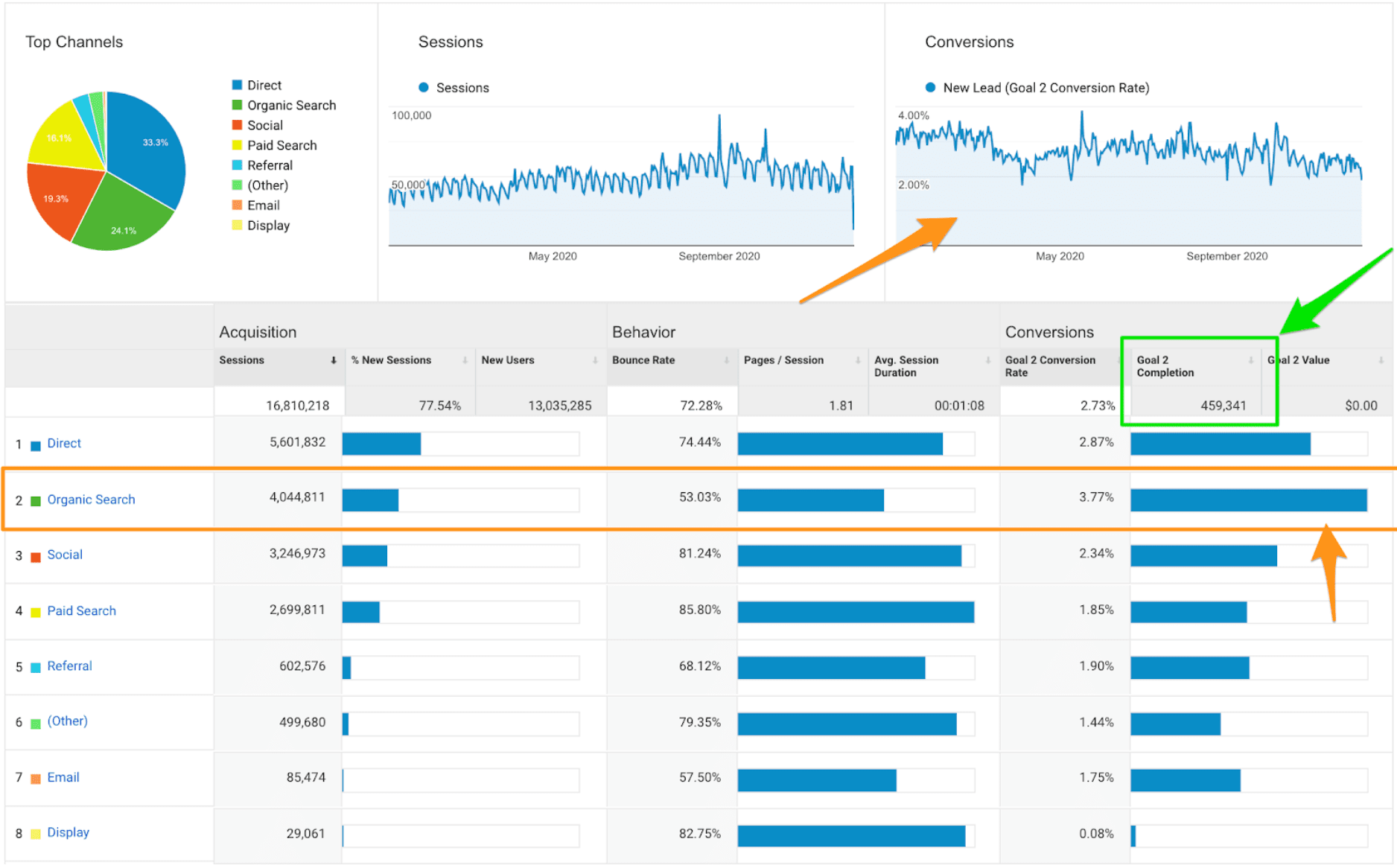
We focus not only on SEO but also on how it builds into Evergreen marketing.
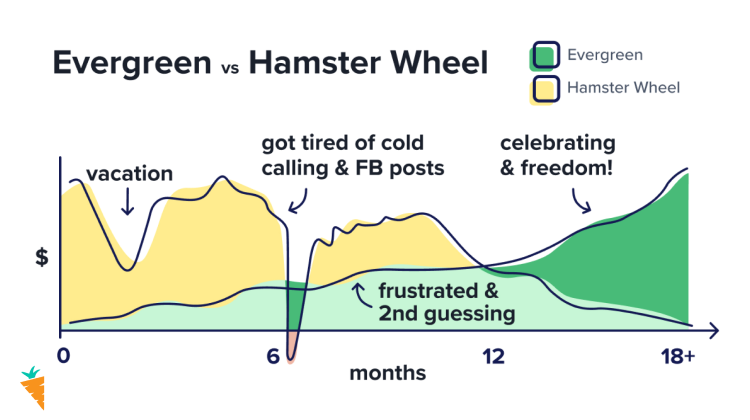
The definition of Evergreen marketing is: “a: retaining freshness or interest: perennial. b: universally and continually relevant: not limited in applicability to a particular event or date.”
In marketing terms, it’s marketing you do once, and it works for years… not hours, days, or weeks. Content relevant for a long time serves your best prospects and gets in front of them where they’re searching online.
Results grow momentum over time = Freedom
We then amplify Evergreen with paid marketing and even hamster wheel marketing.
Hamster wheel marketing is defined as: “any situation that seems endless without goal or achievement.”
In marketing terms, any marketing campaign that works for a short time after you do has a limited life span. Then, you have to do it repeatedly to keep results coming in.
Cold calling, direct mail, posting on social, open houses, etc.
Results stop when you stop = Stress
Growing increasingly into the Evergreen is where you create consistency, freedom, and flexibility.
You can significantly impact your business, but that’s where your most valuable and highest converting leads come from.
Building a solid lead generation engine for your real estate business will give you quality leads for life.
It’s a big goal, but don’t be intimidated.
Here’s some proof…

Tyler Ford has been getting 2x more motivated seller leads with Carrot than with his old site. The Carrot tools and Evergreen marketing content has helped him stand out in my crowded local market.
Here’s his story… Tyler Almost Quit Real Estate After 20 Years – Until he made 8 essential changes.
While paid advertising can immediately bring in motivated seller leads and help your business in the short term… SEO can build momentum and help grow your business over the long term.
But what is SEO?
It’s pretty simple.
When a motivated seller wants to sell their house fast for cash, many go to Google and type in “Sell my house fast in [MARKET CITY].”
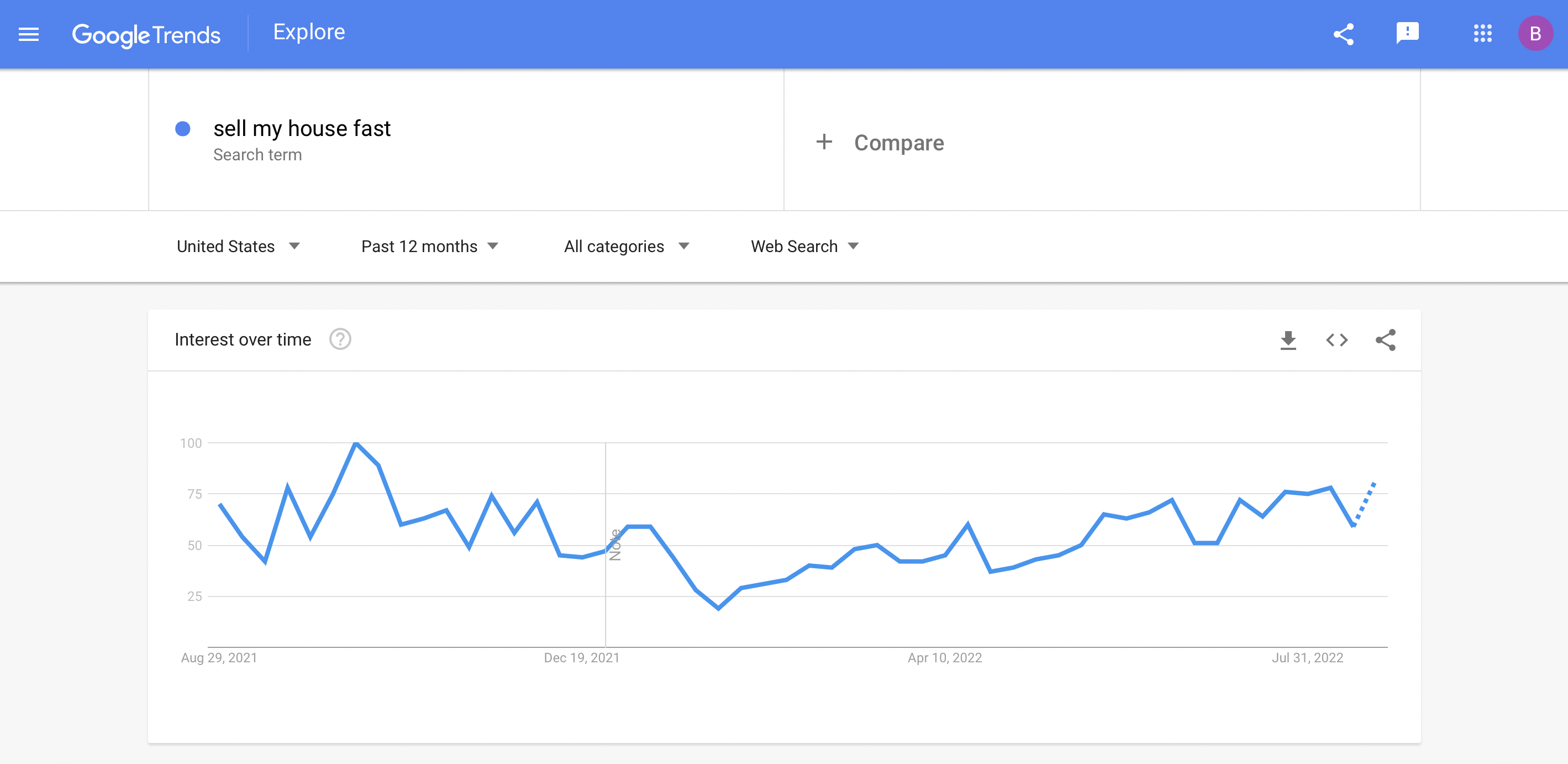
And when they do, Google shows them different websites to help them.
For example, if I search for “Sell my house fast in Dallas,” Google thinks these real estate websites can help me.

Those websites get clicks and traffic from motivated sellers whenever someone types that phrase into Google… which is more often than you’d think.
That traffic then turns into leads (so long as the investor’s website is optimized for conversion), and the investor generates deals monthly through SEO.
You can also pay to get in those search results…

And that is a good idea when you’re starting. But it shouldn’t replace your SEO strategy.
More than 90% of people click on organic results before PPC results.
So here’s the question: how do you get Google to rank your website for a high-value keyword phrase?
Well, it can take time and some patience.
To start, you’ll need to put the correct title on your page, have a website that loads quickly, and do a few other things. Reference this SEO guide for help.
And at Carrot, we have TONS of tools to help you.
We give you monthly SEO-optimized blog post content. Our websites have an SEO-friendly tech stack. We also allow you to track your progress on target keyword phrases and alert you to missing optimizations on any page.
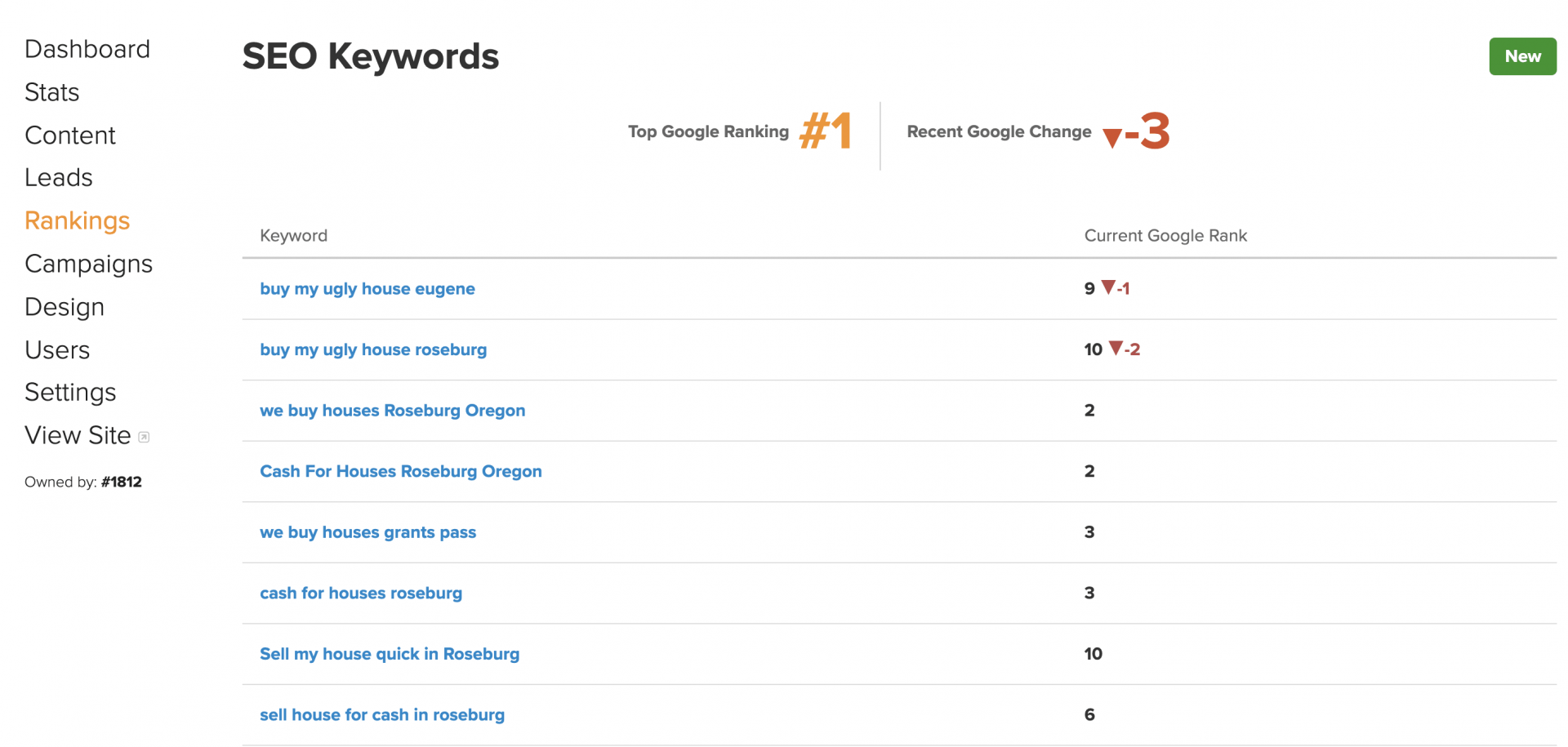
SEO for real estate investors couldn’t be any easier than with a Carrot site. :)
PPC is another valuable asset for generating motivated leads.
Google Ads can work so long as you have a solid strategy. Year after year, it’s one of our Carrot members’ top lead generation methods (behind organic leads).
Our real estate investor members consistently get feedback that their Google Ads leads are closing between 1 in 10 and 1 in 15 leads per deal.
Learn more about Google Ads for real estate investors in this ultimate guide.
3. Social Media Advertising: The power of social media targeting can’t be ignored. Platforms like Facebook and Instagram allow you to create laser-focused advertising campaigns. Target potential sellers based on demographics like age, location, and even interests related to downsizing or relocation.
4. Data Analytics & Lead Generation Tools: For a more sophisticated approach, consider investing in paid tools. These tools aggregate and analyze vast amounts of data on potential sellers. You can target outreach based on factors like absentee ownership, distressed properties, or recent life events that might trigger a homeowner to sell (e.g., job loss, probate, divorce). While these tools come at a cost, they can significantly enhance the quality and efficiency of your lead generation efforts.
Traditional Strategies: Building Relationships and Hitting the Pavement
While the digital world offers a wealth of opportunities, tried-and-true traditional methods still hold value:
1. Direct Mail Campaigns: Direct mailers can be a powerful tool for reaching motivated sellers. Here’s the key: customization. Craft compelling mailers that address specific needs. For example:
- Absentee Owners: Highlight the challenges of managing a property from afar and offer a cash solution for a quick, hassle-free sale.
- Probate Leads: Express your condolences and offer a streamlined process to sell a property inherited through a probate sale.
- Distressed Homeowners: Present yourself as a solution to financial burdens associated with unwanted property.
2. Networking with Local Professionals: Building relationships with individuals “in the know” can be a game-changer. Here are some key connections to cultivate:
- Real Estate Agents: Agents often encounter sellers facing various situations. Develop relationships with agents who understand your investment criteria and can connect you with motivated sellers.
- Property Managers: Property managers deal with absentee owners and may come across situations where a quick sale benefits all parties.
- Title Companies: Title companies handle property transactions and might have insights into potential sellers facing challenges.
3. Cold Calling: Don’t underestimate the power of a well-executed cold call. Here are some tips for success:
- Do your research: Identify the owner’s name and any relevant details about the property beforehand.
- Be clear and concise: Introduce yourself, explain your purpose quickly, and highlight the benefits you offer as a buyer.
- Prepare for objections: Anticipate common objections, such as “I’m not interested in selling,” and prepare responses emphasizing a win-win solution.
4. Driving for Dollars: This strategy involves driving through neighborhoods looking for potential leads. Target areas with neglected properties, overgrown lawns, or “for sale” signs that have been up for extended periods. These signs might indicate absentee ownership or seller motivation for a quick sale. Once you’ve identified a potential lead, research ownership information and send a targeted mail flyer or make a cold call to initiate contact.
One option is to use Google Maps Street View and apps such DealMachine. You can drive for dollars without leaving your house.
Creative Strategies: Thinking Outside the Box
Beyond the traditional methods, consider these creative approaches to expand your pool of motivated sellers:
1. Attend Local Events:
- Foreclosure Auctions: While attending foreclosure auctions can be competitive, they offer opportunities to connect with distressed homeowners directly. You might be able to strike a deal before the auction or offer a solution outside the formal auction process.
- REO (Real Estate Owned) Sales: Banks often hold sales for properties they’ve repossessed (REO). While competition can exist, attending these sales allows you to potentially negotiate directly with the bank for a good deal.
- Community Events: Local fairs, neighborhood gatherings, or even investment seminars can be a chance to connect with potential sellers. Introduce yourself as a real estate investor and explain your interest in buying properties in the area.
2. Offer Value Propositions:
Don’t just wait for sellers to come to you. Instead, consider offering valuable services to attract motivated sellers:
- Free Consultations: Provide free consultations to homeowners considering selling. Analyze their situation, explain your buying process, and highlight the benefits of a quick cash sale.
- Market Analyses: Offer free market analyses to homeowners. This establishes you as a knowledgeable resource and opens a conversation about their selling options.
By providing value upfront, you build trust and position yourself as a solution-oriented buyer, increasing the chances of converting a consultation into a successful deal.
3. Build Partnerships:
Collaboration is key in real estate investing. Partner with other investors who share your goals:
- Cash Buyers: Partner with cash buyers who can offer quick closings, attractive to motivated sellers needing to sell fast.
- Other Investors: Collaborate with other investors to combine resources and expertise. You can expand your reach and target a wider range of motivated sellers by working together.
Thinking creatively and building strong partnerships can unlock new opportunities to connect with motivated sellers and achieve your real estate investment goals.
Quick tip: Reaching out via email is a great way to build partnerships. Using a LinkedIn email finder can also help expand your network and reach potential leads, further improving your ability to identify cash buyers and motivated sellers.
The Difference Between Inbound & Outbound Lead Generation
We’ve shared many different strategies on this blog for real estate lead generation: Traffic plus Conversions, and we’ve shown you a bunch of great strategies for building traffic. If you haven’t read those posts, click those links to check them out… I’ll try not to duplicate much here.
Real estate investors can generate motivated leads using both outbound and inbound (paid and organic) sources.
Confused?
Let me make it more simple.
“Outbound” marketing is direct mail, cold calling, and driving for dollars.
“Inbound” marketing is Google Ads, Microsoft ads, and Facebook strategies, with good content through organic search rankings or SEO.
The Simple Motivated Seller Lead Generation Formula
To generate more motivated seller leads for your business, you first have to understand the simple formula for lead generation.
That is, how is a lead generated in the first place?
Different investors will answer that question differently. Some will say that cold calling is how you generate leads, others will say direct mail, and others will say by personally connecting with people in the community.
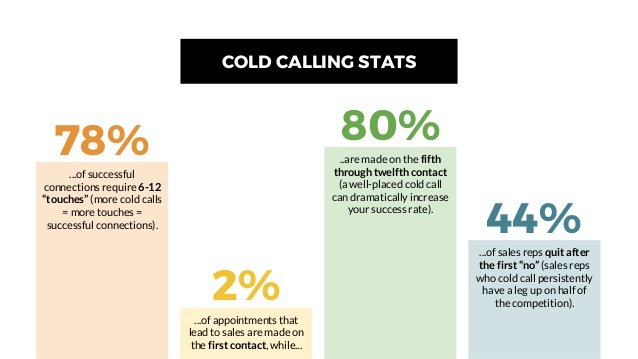
And none of those answers are wrong.
Successful investors also use direct mail and/or cold calling to generate consistent business leads.
But they also do something that very few investors don’t do.
They systematically generate leads by using the formula below…
TRAFFIC + CONVERSION = LEADS
Let’s break that down.
Traffic is when people visit your website. They might come through paid advertisements you’re running (like Facebook Ads or Google Ads) or organically through a search engine (Google) or a social media site (Facebook).
Wherever they come from, one thing is for sure… you can’t generate leads on autopilot through your website if you’re not generating traffic.
Paid ads effectively drive immediate traffic to your website. Building your organic traffic takes a little more time (but the payoff is massive) — more on organic traffic or “SEO” shortly.
What about conversions?
A conversion is when a person takes the action you want them to take after visiting your website. Usually, that’s filling out a form that provides you with their contact information or calling your business directly.
And voila! You have a lead.
Those are the two vital elements to generating motivated seller leads.
You have to drive traffic to your website consistently and consistently convert that traffic into leads for your business.
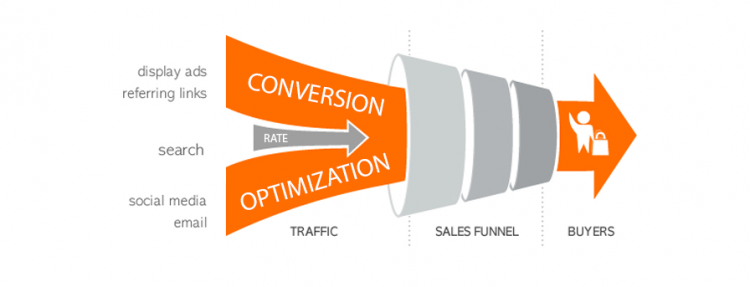
And Carrot websites have the highest conversion rate in the industry (usually between 10% and 20%).

That’s why we believe in our product so much.
We know that if someone takes their organic traffic seriously and uses Carrot to create their website, they’ll have everything they need to build a winning business.
How to Negotiate with Motivated Sellers
When it comes to negotiating with motivated sellers, there are some commonalities.
We all know that price is not something that’s set in stone. And neither is a seller’s immediate inclination to work with or not with you.
They could call you ready to sell but a few days later lose interest. Or they could call skeptically and leave the call prepared to sign.
Part of what determines these outcomes is how you negotiate. What you say, what questions you ask, and how you talk could impact.
So, we asked some experienced real estate investors how they negotiate with sellers to close more deals.
Dive deep into 20 real estate negotiating tips and download our real estate negotiation playbook.
In the meantime, here are a few additional tips.
Negotiating with Motivated Sellers: Securing Profitable Deals
Unearthing motivated sellers is a crucial skill in real estate investing. However, negotiation is equally important to convert those leads into successful transactions. Here’s a breakdown of the key steps involved:
1. Market Research and ARV Determination:
The foundation of any negotiation lies in accurate information. Start by conducting thorough market research to determine the property’s After Repair Value (ARV). This represents the estimated market value of the property once repairs are complete. Consider seeking assistance from a qualified real estate agent who can provide valuable insights and access to comparable property data (comps).
2. Repair Cost Estimation:
Accurately estimating the cost of necessary repairs is critical. For complex repairs, consider engaging a professional contractor to provide a detailed estimate. This ensures your calculations reflect the true cost of bringing the property up to market standards.
3. Max Cash Offer Calculation:
Once you have a solid understanding of the ARV and repair costs, it’s time to calculate your maximum cash offer. A common strategy employed by real estate investors is the 70% rule. Here’s how it works:
- Example: Assume the property’s ARV is $200,000 and estimated repairs come to $30,000.
Following the 70% rule, your maximum cash offer would be:
($200,000 ARV – $30,000 Repairs) x 70% = $119,000 Max Cash Offer
This calculation ensures you leave sufficient room for profit, even if unforeseen repair needs arise during renovations.
4. Strategic Offer Presentation:
While you’ve determined your maximum offer, it’s often wise to start negotiations with a lower figure. This leaves room for compromise and creates the potential for additional profit if the seller accepts your initial offer. A common approach is to subtract $20,000 or more from your calculated maximum cash offer. This becomes your opening bid, allowing for negotiation flexibility while still securing a profitable outcome.
By following these steps and employing effective negotiation tactics, you can increase your chances of securing motivated sellers and achieving successful real estate transactions.
Now, it’s essential to mention one more thing.
Before you bring your offer, you should’ve had a few conversations with the seller.
You should know why they’re selling, how much they hope to get, and how motivated they are.
If you don’t, get that information before you enter into negotiations.
That’s cannon fodder for the discussion you’re about to have — if you know why they’re selling, then you can explain why your offer is what it is and how it will help them.
Conclusion: A Multi-Faceted Approach to Finding Motivated Sellers
The landscape of motivated seller lead generation is constantly evolving. In 2025, a diversified approach is crucial for success. Don’t be afraid to experiment with the abovementioned strategies – both online and traditional methods have their merits.
Here are some key takeaways:
- Cast a Wide Net: Utilize a variety of online platforms, explore creative strategies, and build relationships with local professionals.
- Target Strategically: Tailor your approach to specific seller types, whether it’s absentee owners, distressed homeowners, or those navigating probate.
- Track & Analyze: Monitor the success of each approach. Analyze which methods generate the most leads and the highest conversion rates in your market.
Remember, the key to finding motivated sellers is consistent effort and a willingness to adapt your strategies.
Empower Your Journey:
Becoming a successful real estate investor is an ongoing journey. Here are some resources to fuel your knowledge:
- Industry Publications: Stay up-to-date on market trends and best practices by subscribing to industry publications or blogs.
- Online Courses: Invest in online courses or workshops from reputable sources to refine your skills and learn advanced lead generation techniques.
By combining these resources with the strategies outlined above, you’ll be well-equipped to identify and connect with motivated sellers, paving the way for successful real estate transactions.